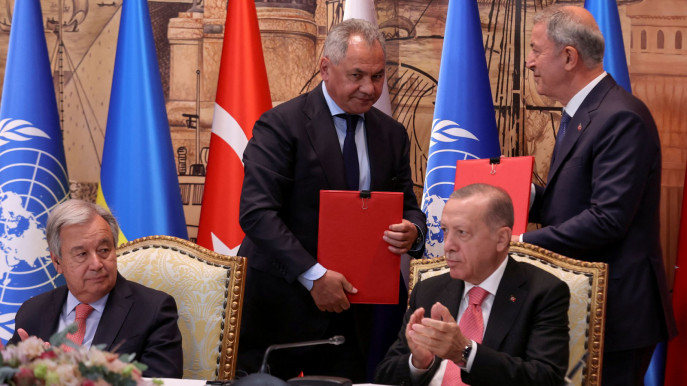
Ukraine’s grain agreement with Russia runs from 22 July 2022 to 17 July 2023. Contract life is short due to non renewal, contract also has several drawbacks. But that was the only diplomatic light in the dark hours of the Russian offensive.
By agreement, Ukraine used the Black Sea to export its grain to the rest of the world.
Although one-third less than normal, 30.3 million tons of grain exports are not less. But in recent times its condition has worsened.
Russia has already been accused of slowing the route in the name of naval resistance and lengthy searches. And finally, the contract was canceled.
Moscow formally withdrew from the grain deal last week. Russia then began launching missile attacks on the ports, despite the country’s earlier pledge not to attack the ports.
One of the destroyed facilities was a grain terminal of Kernel, Ukraine’s largest production company. Officials said 60,000 tons of crops were destroyed last week.
“We stopped exporting for the first two or three months after the war started,” said Kernel CEO Yevhen Osipov.
“Oil and grain prices went up 50 percent, and you’re seeing the same thing happen again.”
Global grain markets appear to have remained stable, but grain prices rose eight percent within a day of Russia withdrawing from the deal, the highest one-day increase since the start of the Ukraine war last February.
The Kremlin agreed not to attack at least three port facilities in the area, but that diplomatic protection is no longer in place.
With destroyed ports, no corridor in the Black Sea, and Russia’s control of much of the coast, Mr. Osimov believes that Ukraine’s grain export capacity will decrease by another 50 percent.
He thinks that people will be less interested in working on the land in the future.
The impact of the end of the grain deal will extend beyond the port of Odessa. The mayor of the city, Gennady Trukhanov, thinks that Moscow wants to show that without them it is not possible to export anything, and rightly so.
Standing atop a 40-meter-high granary in the central Poltava region, there is no doubting the scale of Ukraine’s grain production potential.
The plant the BBC team visited can store 120,000 tonnes of grain. It is now a third full and will continue to fill even more when Ukraine cannot export grain through the Black Sea.
This plan is surrounded by unlimited agricultural land.
It is a country that cannot suddenly stop producing crops at will. This crop will have to be exported somewhere – at least so far that is the hope.
“We feel that we should produce as much grain as possible,” said Yulia, who works as a lab technician at a kernel company, as she poured samples into a pipe.
Before the grain deal, millions of people in the world’s poorest countries were at risk of starvation because Ukraine could not export. After 12 months that risk returned again.
People are starving, there are huge reserves, but they are not accessing it for no reason.
What is Russia saying?
Moscow has previously threatened to pull out of the deal with Ukraine. The reason given by them was that too many conditions were imposed on their own agricultural produce.
They want one of their major banks to be included in the international payment system, sanctions on Russian fertilizer companies lifted, and full access and insurance for Russian ships to foreign ports.
In order to implement these demands of Russian President Vladimir Putin, the Western sanctions will have to be lifted, which is actually unimaginable at this moment.
The Kremlin appeared eager to be part of the solution last July when it appeared that a direct attack on Ukraine had led to a food crisis.
Battlefield frustration seems to have changed that stance.
Turkey, a key mediator of the crop deal alongside the United Nations, says it is likely to be reinstated, although it has not had much impact.
As a result, it can be assumed that this contract has actually been canceled. But is there any way to continue the export of Ukraine?
There are roads and railways over neighboring countries Romania and Poland. But the market gains of these two countries through Ukrainian grain have caused the prices of local products to fall, which has already caused dissatisfaction among the farmers of those countries.
There is a grain export route to Central Europe via the Danube River, using which 2 million tonnes of grain have been exported in the last 12 months. The previous year this number was six lakh tonnes.
Both of these options could cause hesitation in Ukraine’s decision to reroute. Besides, they are quite expensive.